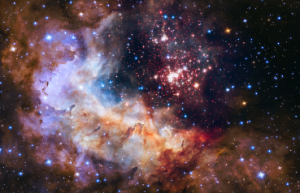A Naturalist's Strong Case Against Abiogenesis
A Naturalist's Strong Case Against Abiogenesis
According to the evidence, in nature, life only comes from life,1 making belief in naturalism and atheism (which require abiogenesis—life from non-life) a blind faith.2 In fact, naturalism is a self-contradictory belief, since a naturalist must believe in such unnatural phenomena.3 And yet, such rational truths are regularly neglected by today’s naturalist-dominated scientific community. Ironically, some acknowledge the total failure of naturalism to provide a reasonable explanation for how life came from non-life and proceed to (unconsciously) make a case against it that is as good as the case creationists have long made against abiogenesis. Hostile witness testimony is powerful evidence, since hostile witnesses are less likely to acknowledge the claims made by those they dislike or with whom they disagree. A good example of hostile witness testimony that supports creationist arguments about abiogenesis is a recent article in New Scientist by Michael Marshall entitled “Life’s Big Bang.”4 Here are some telling quotes from the article that we could not have said better.
On the Long-standing Failure of Naturalists to Explain the Origin of Life
- “Many ideas have been proposed to explain how it began. Most are based on the assumption that cells are too complex to have formed all at once, so life must have started with just one component that survived and somehow created the others around it. When put into practice in the lab, however, these ideas don’t produce anything particularly lifelike. It is, some researchers are starting to realise,5 like trying to build a car by making a chassis and hoping wheels and an engine will spontaneously appear. The alternative—that life emerged fully formed—seems even more unlikely.”
- “An early idea put proteins in the driving seat. In the 1950s, biochemist Sidney Fox discovered that heating amino acids made them link up into chains…. However, the proteinoids never got much further. Some researchers still hunt for lifelike behaviour in simple proteins, but the idea that proteins started life on their own has now been largely rejected.”
- “More recently, much research has focused on an idea called the RNA world…. However, biochemists have spent decades struggling to get RNA to self-assemble or copy itself in the lab, and now concede that it needs a lot of help to do either.”
- “Perhaps, then, membranes came first. David Deamer at the University of California, Santa Cruz, has championed this option. In the 1970s, his team discovered that lipids found in cell membranes could be made when two simple chemicals, cyanamide and glycerol, were mixed with water and heated to 65°C…. Nevertheless, he now accepts that this isn’t enough, because lipids can’t carry genes or form enzymes.”
- “A handful of scientists argue that life didn’t begin on Earth, but elsewhere in the universe, and that it was carried here on meteoroids and other space bodies…. The idea is called ‘panspermia’. Aside from the fact that this simply relocates the problem of how life got going, we also haven’t found evidence of life elsewhere. If panspermia were true, bacteria would be raining down on Earth from space, and neighboring worlds like the moon would be scattered with their remains. But there is no evidence of incoming bacteria, and moon rocks are sterile. Furthermore, space is hostile to life. In experiments where bacteria were placed outside the International Space Station, even exposures of a year took a heavy toll. This leaves a window for life to travel within the solar system, but it is a narrow one: the trip from Mars to Earth would take many months at least. Travel from other stars would take millennia, so looks impossible.”
Translation: the arguments that have long been used in support of abiogenesis, and which continue to be promoted in textbooks, are all acknowledged now to be wrong based on the physical evidence.
Naturalists: “The Origin of LIFE Is Apparently More Complicated Than We Thought.”
- “The problem with understanding the origin of life is that we don’t know what the first life was like. The oldest accepted fossils are 3.5 billion years old,6 but they don’t help much. They are found in ancient rock formations in Western Australia known as stromatolites and are single-celled microorganisms like modern bacteria. These are relatively complex: even the simplest modern bacteria have more than 100 genes. The first organisms must have been simpler. Viruses have fewer genes but can reproduce only by infecting cells and taking them over, so can’t have come first.”
- “Life can be boiled down to three core systems. First, it has structural integrity: that means each cell has an outer membrane holding it together. Second, life has metabolism, a set of chemical reactions that obtain energy from its surroundings. Finally, life can reproduce using genes, which contain instructions for building cells and are passed on to offspring…. Life’s three core processes are intertwined. Genes carry instructions for making proteins, which means proteins only exist because of genes. But proteins are also essential for maintaining and copying genes, so genes only exist because of proteins. And proteins—made by genes—are crucial for constructing the lipids for membranes. Any hypothesis explaining life’s origin must take account of this. Yet, if we suppose that genes, metabolism and membranes were unlikely to have arisen simultaneously, that means one of them must have come first and ‘invented’ the others.”
Translation: life is (in the words of intelligent design advocates) “irreducibly complex.” All necessary components for life had to be in place from the beginning, or life could not exist, making naturalistic theories for the origin of life implausible, irrational, and fideistic.
“Well, If Simple Explanations Don’t Work…”
What is the naturalists’ response to the above crushing admissions? Even though the only other “naturalistic” option “seems even more unlikely” according to Marshall, naturalists are essentially conceding the irreducible complexity of life, but are continuing to deny the decisive, rational evidence of a Designer that is demanded by their laboratory findings. If “simple explanations of how life got started don’t add up,” Marshall says, the explanations (contrary to common sense) must be complex instead. “The shortcomings of these simple models of life’s origin have led Deamer and others to explore the seemingly less plausible alternative that all three systems emerged together in a highly simplified form”: the “everything-first idea” for the origin of life. Really?
Proving the legitimacy of that “less plausible alternative,” Marshall explains, has been the pursuit of various laboratories over the last several years. While acknowledging the shortcomings of their results as well (e.g., “pieces of the puzzle are still missing,” and “It remains to be seen whether [they—JM]…can work”), Marshall admits that, nevertheless, they “are our best model yet…. Perhaps the most persuasive argument [for complexity—JM] is that the simpler ideas don’t work.” But assuming the first life was more complex makes abiogenesis even less plausible, as he admitted. How is that a good solution to the problem? Marshall continues: “As is the case with many things in life, the beginning was probably more complicated than we had thought.” (Wait, haven’t creationists been saying that all along?) Translation: since we can’t get a simple brick to make itself in order to start building a house (we’ve tried), the solution must be that the whole house, comprised of intricate design, complexity, and bricks was accidentally (and magically) manufactured all at once…without a manufacturer. Better option: Hebrews 3:4—there was a manufacturer for the house: “For every house is built by someone, but He who built all things is God.”
Endnotes
1 Jeff Miller (2012), “The Law of Biogenesis [Part I],” Reason & Revelation, 32[1]:2-11, https://apologeticspress.org/apPubPage.aspx?pub=1&issue=1018; see also, Jeff Miller (2017), Science vs. Evolution (Montgomery, AL: Apologetics Press), second edition, pp. 61-110.
2 Jeff Miller (2013), “‘Unlike Naturalists, You Creationists Have a Blind Faith,’” Reason & Revelation, 33[7]:76-83, https://apologeticspress.org/apPubPage.aspx?pub=1&issue=1125&article=2164.
3 Jeff Miller (2017), “Evolution Is Self-Contradictory,” Apologetics Press, https://apologeticspress.org/APContent.aspx?article=5468.
4 Michael Marshall (2020), “Life’s Big Bang,” New Scientist, 247[3294]:34-38. Emphasis is added throughout the following quotes.
5 New Scientist is published in the U.K., explaining the variant spelling of many words throughout the following quotes.
6 Note that scientific and biblical evidence supports a young Earth, on the order of thousands, not billions, of years. See Jeff Miller (2019), “21 Reasons to Believe the Earth is Young,” Reason & Revelation, 39[1]:2-11.



0 Comments:
Post a Comment
<< Home